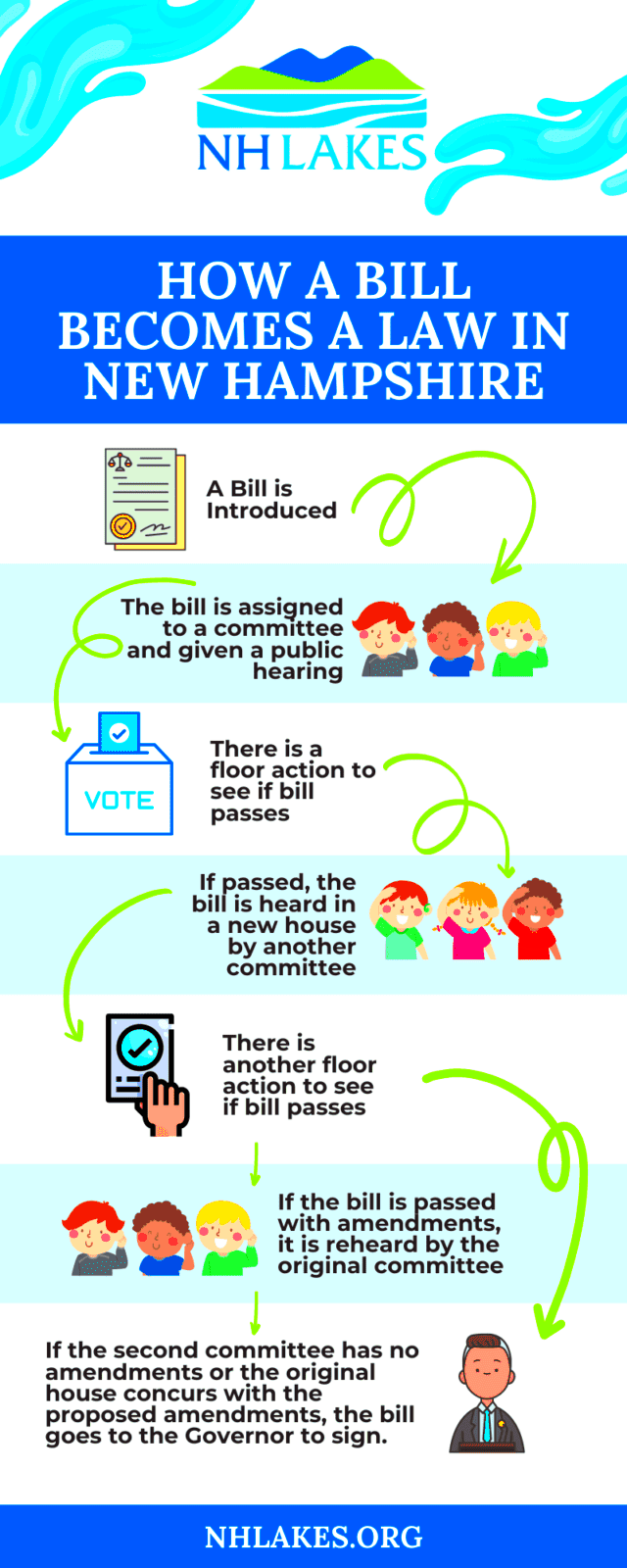Common Law in New Hampshire Explained
Common law is mainly based on decisions made by the judiciary rather than by statutes or legislation. In New Hampshire, common law is a very fundamental source of the legal system. Judges revert to common law in cases that are not provided for in the statutes. This system relies heavily on precedents, meaning current cases are influenced by past judicial rulings. Understanding common law in New Hampshire helps individuals and businesses navigate the legal system more effectively.
History of Common Law in New Hampshire

The basis of New Hampshire’s common law can be traced back to the colonial era when the area was ruled by England. The following are some important milestones in the history:
- Colonial Influence: New Hampshire adopted English common law when it became a colony in 1623.
- Revolutionary Changes: Following the American Revolution, the state established its own judicial system while retaining common law principles.
- State Constitution: The New Hampshire Constitution, adopted in 1784, recognized common law’s significance in the legal framework.
- Judicial Decisions: Over the years, New Hampshire courts have made landmark rulings that have shaped common law, creating precedents that are still referenced today.
This timeline reveals the way common law has changed and met the special needs of New Hampshire residents.
Key Principles of Common Law
New Hampshire’s common law has a number of foundational principles that determine its use. A grasp of these principles can shed light on how the legal system functions:
- Precedent: Past judicial decisions guide current cases, ensuring consistency and predictability in the law.
- Case Law: Laws develop through court rulings, allowing the legal system to adapt to changing societal values.
- Judicial Discretion: Judges have the authority to interpret laws and create new precedents, allowing for flexibility in the legal process.
- Equity and Fairness: Common law aims to achieve just outcomes by considering the circumstances of each case.
- Evolution: Common law is not static; it evolves as courts address new issues and societal changes.
In this way, common law is able to be kept in touch with the society’s expectations and demands, all the while being grounded on a solid legal foundation.
Common Law vs. Statutory Law in New Hampshire
In New Hampshire, differentiation among statutory and common law is essential for understanding the legal system. Though both laws regulate behaviours and help settle conflicts, their sources are dissimilar and they serve different purposes. Judicial decisions form common law while legislative bodies come up with statutory law. This differentiation contributes significantly to interpretation and implementation of laws within the state.
These are some main variances:
- Source:
- Common Law: Established through court decisions and precedents.
- Statutory Law: Created and enacted by the state legislature.
- Flexibility:
- Common Law: Adaptable to changing circumstances and societal values.
- Statutory Law: More rigid, as changes require legislative action.
- Application:
- Common Law: Applies in cases where no specific statute exists.
- Statutory Law: Governs specific issues outlined in the law.
In New Hampshire, both kinds of laws are extremely significant because they work together to build a complete set of legal rules that require fairness and justice.
Role of Common Law in the Legal System
Common law plays an important part in the legal system of New Hampshire. It not only provides fundamental principles for judicial decision-making but also fills the gaps in statutory law. This flexibility allows judges to adjust legal interpretations to the specifics of every case, thereby delivering justice. Here are some significant functions of common law:
- Precedent Setting: Judges rely on prior rulings to maintain consistency in legal interpretations.
- Guidance for Judges: Common law provides a framework for judges when making decisions in cases lacking specific statutes.
- Adaptability: The ability to evolve over time allows common law to remain relevant and responsive to societal changes.
- Protection of Rights: Common law principles often help protect individual rights and ensure fair treatment under the law.
This adaptable position highlights the contribution of common law to the judicial system of New Hampshire and its impact on individual lives in the state in general.
Common Law Precedents and Their Importance
The common law precedents are important for understanding the operation of the legal system in New Hampshire. When a judge makes a ruling, that ruling may become a precedent and thus an authority in subsequent cases. There are several reasons why reliance on past decisions is critical:
- Consistency: Precedents help ensure that similar cases are treated similarly, promoting fairness in the legal system.
- Predictability: Knowing how courts have ruled in the past allows individuals and businesses to anticipate potential outcomes.
- Legal Development: Precedents can lead to the evolution of the law, reflecting changing societal values and norms.
- Judicial Efficiency: Referring to established precedents can speed up the decision-making process, saving time and resources in the courtroom.
It can be said that case laws are the foundation of New Hampshire’s legal system. The law guides judges when making decisions and helps to maintain public faith in the judiciary by making it consistent and fair.
Challenges and Criticisms of Common Law
New Hampshire’s common law is appropriate and significant as far as the legal system is concerned, however; it has some challenges and criticisms. When society changes, legislation which governs must also change. Some of the major challenges facing common law nowadays are as follows:
- Slow to Adapt: Common law can be slow to change. Since it relies heavily on precedents, significant shifts in societal norms may take time to reflect in judicial rulings.
- Complexity: The reliance on case law can make the legal landscape complicated for individuals to navigate. Understanding how past decisions apply to current situations can be daunting.
- Access to Justice: Legal precedents can create barriers for those without adequate legal representation. This can lead to inequities in how justice is administered.
- Over-Reliance on Judges: Critics argue that too much power is placed in the hands of judges, which can lead to inconsistencies in how laws are applied.
- Confusion with Statutory Law: The interaction between common law and statutory law can sometimes cause confusion, particularly when statutes override established common law principles.
Ongoing dialogue among legal professionals, lawmakers, and the community is required to address these challenges, so that common law can effectively serve its purpose.
Future of Common Law in New Hampshire
The outlook for the common law sharing in New Hampshire is both encouraging and unpredictable. Legal situation will correspondingly change as the society continues to evolve with time. Some future issues and indications are as follows:
- Increased Adaptability: Courts may become more willing to adapt common law principles to address contemporary issues, such as technology and privacy rights.
- Legislative Influence: As lawmakers respond to societal changes, statutory law may increasingly influence common law decisions, leading to a hybrid legal approach.
- Focus on Access: There is a growing emphasis on improving access to justice, which may prompt reforms in how common law is applied and understood.
- Educational Initiatives: Legal education may evolve to emphasize understanding common law and its implications for everyday citizens.
- Judicial Innovation: New Hampshire courts might adopt innovative practices to address challenges and enhance the efficiency of the legal system.
When it comes to the future of common law in New Hampshire, a harmonious coexistence between traditional and modern approaches is more likely; this will keep the law applicable and fair.
FAQs about Common Law in New Hampshire
The matter of common law is intricate, and various individuals have queries on the functioning of this legal system in New Hampshire. This article aims to provide you with some of the commonly asked questions:
- What is common law?Common law refers to laws developed through court decisions and judicial precedents rather than through legislative statutes.
- How does common law differ from statutory law?Common law is based on judicial rulings, while statutory law is created by legislative bodies. Common law evolves over time, whereas statutory law is fixed until amended or repealed.
- Can common law change?Yes, common law can change as courts issue new rulings and set new precedents in response to societal changes.
- Why is common law important?Common law is important because it provides consistency and predictability in the legal system, helping judges make fair decisions based on established precedents.
- How can I learn more about common law?You can learn more about common law through legal resources, law libraries, and by consulting legal professionals in New Hampshire.
Common law and New Hampshire’s legal system are both complicated concepts that often need clarification; this FAQ serves to do just that.
Conclusion on Common Law in New Hampshire
To sum up, common law is a crucial factor that determines how law operates in New Hampshire. The principle of relying on judicial precedents promotes stability and flexibility in the legal system. However, despite its numerous drawbacks like complexity and slow adaptation to change, there is hope for the future of common law as it continues to evolve alongside social transformations. In so doing, common law will still be an important instrument for justice and equality. Adopting this evolving form of law can help make sure that it meets everyone’s demands thereby ensuring a fair society.


